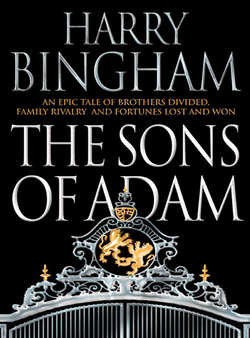Читать книгу The Sons of Adam - Harry Bingham - Страница 29
22
ОглавлениеThe battalion moved off at eight that evening. Its goal: a full-frontal attack on enemy positions.
It was pitch-black and raining, and the ground was evil. Three times, artillery fire forced the company to flatten itself into whatever cover was available. Each time the shelling lifted, the company moved forwards again, leaving a small handful of wounded men behind. On one occasion, Alan was struck with a shell splinter, shaped like a goose quill, in his shoulder blade. An NCO lying in the ditch next to him tweaked it out with finger and thumb and threw it away. Neither man commented on the incident, or was even thinking about it five minutes later.
They reached their designated position shortly after midnight. The men ate rations from their packs and were given permission to rest until four.
The rain settled in and grew heavier. Time moved with agonising slowness.
At four o’clock, a thunder of British artillery opened up behind them, and they could hear the torrent of shells crashing down on German positions. The men listened in silence: half pleased at the thought of what the shells were doing to the enemy, half terrified because of what this implied for the coming offensive. Alan stayed with his men. Although Tom was close by, he might as well have been on another planet for all Alan knew of him.
Four thirty approached. The rain was beginning to fall more gently and a meagre grey light began testing its options on the eastern horizon. Alan’s eyes struggled to follow the luminous figures on his watch. The second hand swept remorselessly round. And finally, it was four thirty precisely. Alan raised his hand and dropped it: the signal to advance.
His men moved off. For several seconds, there was silence – beautiful silence. Then, almost simultaneously, three flares rose from the German-held salient. The flares disclosed what the German defenders already suspected. There was a trickle of rifle fire, then a din of machine guns, then the extraordinary violence of concentrated shelling. Air became metal. The noise was so indescribably loud that the sense of hearing fell away until it was almost like walking into silence.
Alan saw the men next to him hold their positions, just as they’d been drilled. No clustering together, no turning human lives into simple targets for German gunners. But the men walked as though into a gale. Bent over. Doubled up.
As he watched his men, he saw one of them struck full in the chest and sink to his knees with a soft ‘Ah!’ of release. Another man bent down, apparently to fiddle with his bootlaces, but he bent too far and slid to earth with dark red tongues of blood where his face should have been. All around, men were falling when they should be walking. Alan watched in mounting amazement and shock. His platoon was being destroyed, his beloved men massacred, soldierlike and courageous to the end.
Still they advanced.
Alan had no real recollection of the next few hours. Only by midday did the true situation unfold. The attack had largely failed. The attackers had bitten off a chunk of German line at huge cost. The two opposing artilleries screamed at each other. In the chaos of collapsed and broken trenches, both sides attempted to reconfigure their defences.
The day passed.
The list of known casualties was appalling. More than half of Alan’s men had been killed or wounded. So had all of his NCOs. So too with Major Fletcher, whose left arm had been torn off by a shell, and who had been found sitting upright in the mud, holding his arm between his knees, repeating endlessly, ‘My poor boys, my poor bloody boys …’
There was no word of Tom.
For two more nights and days the fighting continued. Alan was tired beyond tired, shattered beyond endurance. And then finally, he was given permission to rest.
The permission came in the form of a German Minenwerfer, which hurled through the air looking something like a flying dustbin, but a bin packed with enormous destructive power. The canister detonated twelve yards away on the unprotected side of the parapet. Afterwards, Alan thought he recalled seeing the flash of detonation before it reached him, but supposed he must have provided details of the explosion from his imagination.
And that was all.
The flash – then silence. No pain. No slow fade-out into unconsciousness. Simply a plunge into blackness. Total blackness.
And still no word of Tom.
